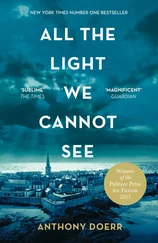She leaned across the blond man beside her, into the aisle. “Really?” She nudged the blond man and said something and he looked over and up and said the bin was fine and latched tight.
“Are you sure?”
“Quite.”
The woman turned to Winkler. “It’s fine. Thank you.” She went back to her book. Two or three minutes later the plane began to buck, and the entire cabin plunged for a long second. The bin above them rattled, the door clicked open, and a bag dropped into the aisle. From inside came the muffled crunch of breaking glass.
The blond man lifted the bag and peered inside and swore. The plane leveled off. The bag was straw and printed with an image of a sailboat. The man began taking out pieces of what looked like souvenir martini glasses and shaking his head at them. A flight attendant squatted in the aisle and collected fragments in an airsickness bag.
The woman in the middle seat stared at Winkler with a hand over her mouth.
He kept his gaze out the window. The frost between the panes was growing, making tiny connections, a square inch of delicate feathers, a two-dimensional wonderland of ice.
He called them dreams. Not auguries or visions exactly, or presentiments or premonitions. Calling them dreams let him edge as close as he could to what they were: sensations—experiences, even—that visited him as he slept and faded after he woke, only to reemerge in the minutes or hours or days to come.
It had taken years before he was able to recognize the moment as it approached—something in the odor of a room (a smell like cedar shingles, or smoke, or hot milk and rice), or the sound of a diesel bus shaking along below an apartment, and he would realize this was an event he had experienced before, that what was about to happen—his father slicing his finger on a can of sardines, a gull alighting on the sill—was something that had already happened, in the past, in a dream.
He had standard dreams, too, of course, the types of dreams everyone has, the film reels of paradoxical sleep, all the improbable narratives concocted by a cerebral cortex working to organize its memories. But occasionally, rarely, what he saw when he slept (rain overwhelmed the gutters; the plumber offered half his turkey sandwich; a coin disappeared, inexplicably, from his pocket) was different—sharper, truer, and premonitory.
All his life it had been like this. His dreams predicted crazy, impossible things: stalactites grew out of the ceiling; he opened a door to find the bathroom stuffed with melting ice. And they predicted everyday things: a woman dropped a magazine; a cat delivered a broken sparrow to the back door; a bag fell from an overhead bin and its contents broke in the aisle. Like dreams these apparitions ambushed him in the troubled fringes of sleep, and once they were finished, they were almost always lost, disbanding into fragments he could not reassemble later.
But a few times in his life he had fuller visions: the experience of them fine-edged and hyperreal—like waking to find himself atop a barely frozen lake, the deep cracking sounding beneath his feet—and those dreams remained long after he woke, reminding themselves to him throughout the days to come, as if the imminent could not wait to become the past, or the present lunged at the future, eager for what would be. Here most of all the word failed: These were dreams deeper than dreaming, beyond remembering. These dreams were knowing.
He shifted in his seat and watched phalanxes of clouds pass below the wing. Memories scudded toward him, as distinct as the fibers in the seat-back in front of him: he saw the blue glow of a welding arc flicker in a window; he saw rain washing over the windshield of his old Chrysler. He was seven and his mother bought him his first pair of eyeglasses; he hurried through the apartment examining everything: the structure of frost in the icebox, a spattering of rain on the parlor window. What a marvel it had been to see the particulars of the world—rainbows of oil floating in puddles; columns of gnats spiraling over Ship Creek; the crisp, scalloped edges of clouds.
He was on an airplane, fifty-nine years old, but he could be simultaneously—in the folds of memory—a quarter century younger, in bed, in Ohio, falling asleep. The house was still and going dark. Beside him his wife slept on top of the comforter, legs splayed, her body giving off heat as it always did. Their infant daughter was quiet across the hall. It was midnight, March, rain at the windows, and he had to be up at five the next morning. He listened to the click and patter of drops against the panes. His eyelids fell.
In his dream, water swirled three feet deep in the street. From the upstairs window—he was standing at it, palms against the glass—the neighborhood houses looked like a fleet of foundered arks: flood-water past the first-floor sills, fences swallowed, saplings up to their necks.
His daughter was crying somewhere. Behind him the bed was empty and neatly made—where had his wife gone? Boxes of cereal and a few dishes stood on the dresser; a pair of gum boots waited atop the stairs. He hurried from room to room calling for his daughter. She was not in her crib or the bathroom or anywhere upstairs. He pulled on the boots and descended to the front hall. Two feet of water covered the entire first floor, silent and cold, a color like milky coffee. When he stood on the hall carpet, the water was past his knees. His daughter’s whimpering echoed strangely through the rooms, as if she were present in every corner. “Grace?”
Outside more water muttered and pressed at the walls. He waded forward. Pale spangles of reflected light swung back and forth over the ceiling. Three magazines turned idly in his wake; a bloated roll of paper towels bumped his knee and drifted off.
He opened the pantry and sent a wave rolling through the kitchen, jostling the stools. A group of half-submerged lightbulbs like the caps of tiny drifting skulls sailed toward the refrigerator. He paused. He could no longer hear her. “Grace?”
From outside came the sound of a motorboat passing. Each breath hung in front of him a moment before dispersing. The light was failing. The hairs on his arms stood up. He picked up the phone—the cord floating beneath it—but there was no dial tone. Something sour and thin was beginning to rise from his gut.
He forced open the basement door and found the stairwell entirely submerged, lost beneath a foamy brown rectangle of water. A page from a calendar floated there, something of his wife’s, a photo of a candy-striped lighthouse, darkening and turning in the froth.
He panicked. He searched for her beneath the hall table, behind the armchair (which was nearly afloat now); he looked in ridiculous places: the silverware drawer, a Tupperware bowl. He waded with his arms down, feeling below the surface, dragging his fingers along the floor. The only sounds were of his lower body splashing along and the smaller percussions of waves he’d made lapping against the walls.
He found her on his third pass through the family room. She was in her bassinet, atop the highest shelf of his wife’s plant stand, against the foggy window, her eyes wide, a blanket over her shoulders. Her yellow wool cap on her head. Her blanket was dry. “Grace,” he said, lifting her out, “who put you up there?”
Emotion flitted across her face, her lips tightening, her forehead wrinkling. Just as quickly, her expression eased. “It’s okay,” he said. “We’ll get you out of here.” He held her against his chest, waded through the hall, and dragged open the front door.
Water sighed in from the yard. The street had become a clotted, makeshift river. The sugar maple on the Sachses’ lawn was lying immersed across the street. Plastic bags, snagged in the branches, vibrated in the passage of water and sent up a high, unearthly buzzing, a sound like insects swarming. No lights were on. Two cats he had never seen before paced a low branch of the front yard oak. Dozens of possessions were adrift: a lawn chair, a pair of plastic trash cans, a Styrofoam cooler—all slathered with mud, all parading slowly down the street.
Читать дальше












